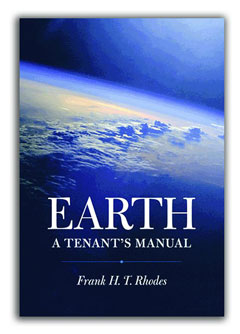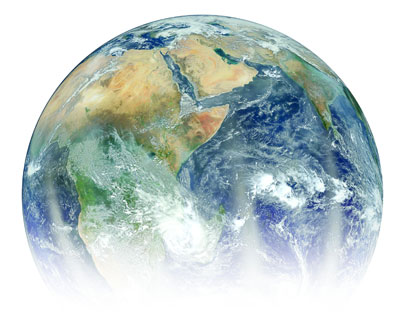 The Cornell president emeritus and geologist admits that the subject of his new book is “ridiculously comprehensive.” In Earth: A Tenant’s Manual, published in June by Cornell University Press, Rhodes offers a primer on the planet’s natural history, contemplates the challenges facing it—both man-made and otherwise—and suggests possible “policies for sustenance.” As Rhodes writes: “It is not Earth’s sustainability that is in question. It is ours.”
The Cornell president emeritus and geologist admits that the subject of his new book is “ridiculously comprehensive.” In Earth: A Tenant’s Manual, published in June by Cornell University Press, Rhodes offers a primer on the planet’s natural history, contemplates the challenges facing it—both man-made and otherwise—and suggests possible “policies for sustenance.” As Rhodes writes: “It is not Earth’s sustainability that is in question. It is ours.”
President Emeritus Frank Rhodes explores man’s effect on the ecosystem
For a brief time, St. Matthew Island, Alaska, was a reindeers’ paradise—boasting ample carpets of tasty lichen and no predators. In 1944, twenty-nine of the animals were released on the island to serve as an emergency food source for U.S. Coast Guard personnel stationed there.
Thirteen years later, there were 1,350 of them, most seeming fat and happy.
 By 1963, there were 6,000, though less healthy and with fewer young.
By 1963, there were 6,000, though less healthy and with fewer young.
Three years later, there were only forty-two, all adults.
By the Eighties, they were all dead.
“The island just consisted of bleached bones,” says President Emeritus Frank H. T. Rhodes. “They had simply overgrazed it. They were in a place that was wonderfully suited to them, but they exploded in numbers and ate themselves into extinction.”
For Rhodes, the St. Matthew reindeer offer a cautionary tale of the dire costs of over-exploiting an ecosystem. The eminent geologist cites their example in Earth: A Tenant’s Manual—a comprehensive look at the structure of the planet, an analysis of how humans have depleted it, and a road map for how our species can live more sustainably. “Nothing lives forever,” Rhodes says. “There are all kinds of reasons that different species, including dinosaurs, became extinct. And as you look at our own species, we’ve been around just a short time, but we have an impact on the planet that is out of all proportion to our numbers. We have an impact on every other species, too—and I’ve become increasingly concerned about the effect we’re having on the planet on which we depend.”
In the 350-page, general-audience book, published in June by Cornell University Press, Rhodes offers a primer on the planet’s natural history and goes on to contemplate the challenges facing it, both man-made and otherwise—from earthquakes and asteroids to chemical pollution and soil depletion. He gives an overview of global warming and its causes and contemplates the costs of such ills as hunger and disease. In the final chapter, he suggests “policies for sustenance,” including expanded recycling and reuse, increased energy efficiency, the restoration of damaged ecosystems, the implementation of pro-sustainability taxes and subsidies, the development of new technologies, and the leveraging of local environmental concerns into a national consensus. “We are just a tiny, tiny part of this great cavalcade of living things,” Rhodes says. “But it’s easy to forget that we share the planet with two million other named species, and the effect we’re having on them is huge. We just assume that every other species gets out of the way while we take what we want. But there’s a limit to how long we can go on doing that, because like it or not we depend to varying degrees on many of these other species. We injure not just them, but ourselves, by the casual way in which we plunder the planet.”

Rhodes, who took office in 1977, was the longest serving president in the Ivy League when he retired in 1995. He and his wife, Rosa, spend the winter months on the west coast of Florida; when in Ithaca, the eighty-five-year-old Rhodes puts in full days in his Snee Hall office. He’s enjoying fine health—for his mobility, he thanks a knee replacement at the Mayo Clinic a couple of years ago—and still leads the occasional Cornell’s Adult University trip, such as a winter 2011 foray to the Galápagos Islands. He’s been working on Earth, which he laughingly describes as “ridiculously comprehensive,” for the past several years. “I write slowly and in longhand,” he says. “I tend to think before I write, I revise endlessly, and I’m never quite satisfied with what comes out of it.”
Earth was written with guidance from some two dozen Cornell faculty—who, as Rhodes puts it, “checked what I was doing and helped me with crazy questions.” He deems himself “reasonably satisfied” with the outcome, and now plans to tackle another book project, a follow-up to his 1976 volume The Evolution of Life. In the meantime, he hopes that Earth will generate discussion on how human habits are harming the planet—and, most important, what can be done to ameliorate the damage and preserve the Earth for future generations of all species. “It’s an issue that isn’t going to go away,” he says. “And whether you agree with the broad conclusions I come to or not, it’s an issue we have to tackle, because our population is going to go up another 50 percent before it stabilizes—and we’ve got to face the fact that if we’ve got problems now, we’ll have far more as population rises. The trouble is that on these big policy issues, you can’t have a kind of United Nations ordinance that says, ‘This is what we’re going to do.’ The world doesn’t work that way.”


